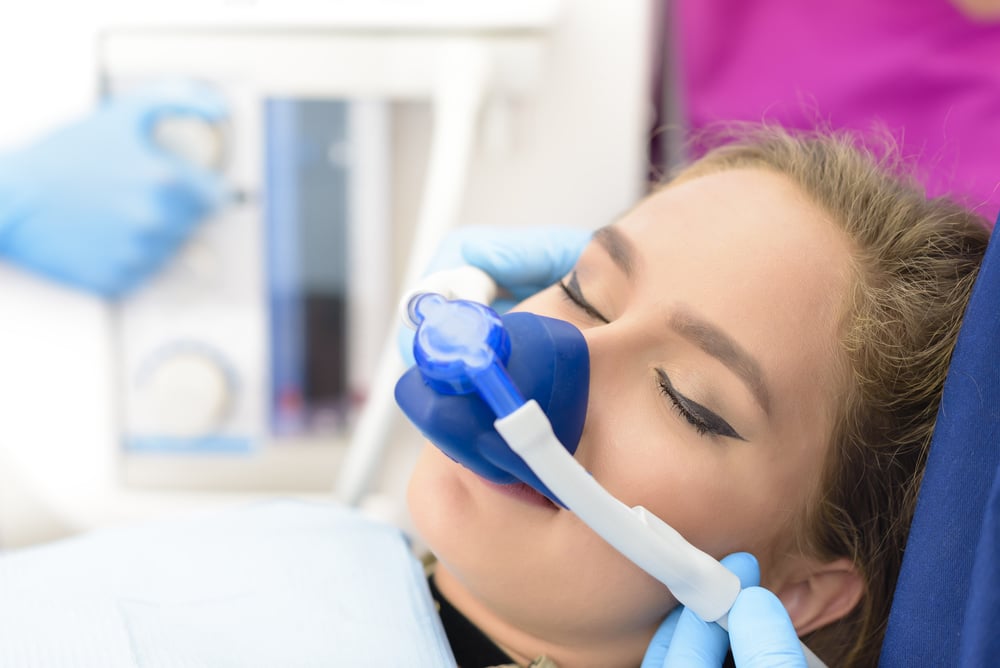Downtown Dental Excellence offers Sedation Dentistry in Cleveland, TX
Visiting the dentist can be an extremely stressful situation for a lot of patients. While a patient being uncomfortable is obviously stressful for the patient, it is also stressful for the dentist. It can be difficult for a dentist to work on a patient’s teeth if they are nervous and squirming around in fear. There are also certain procedures that patients simply can’t be alert during. These procedures can be painful, and can be in-depth. For these types of procedures, the dentist needs the ability to work on the patient’s teeth for a long period of time, without having to worry about the patient being uncomfortable. Whether a dentist needs a patient to be able to sit still for a long time, or they simply want to relieve some of a patient’s anxiety, sedation dentistry may be an excellent option for both the patient and the dentist.
What Is Sedation Dentistry?
Sedation dentistry refers to the sedation of a patient during a procedure. There are various forms of sedation that a dentist may choose from, and there are different levels of sedation dentistry. The various types and levels of sedation all have their particular benefits, and are appropriate for different situations.

Levels of Sedation Dentistry
There are three main levels of sedation dentistry: mild, medium and deep. Downtown Dental Excellence offers all 3.
Mild Sedation
Mild sedation dentistry is an excellent choice for the reduction of anxiety. If a patient lets the dentist know that they are scared about a procedure, the dentist may choose to provide a mild form of sedation to ease the patient’s nerves. This sort of sedation also helps to decrease or even eliminate the pain that a patient is experiencing.
Medium Sedation
If mild sedation dentistry isn’t enough for a particular procedure, a dentist may decide on the next level of sedation dentistry. This level of sedation dentistry helps to create a deep state of relaxation, and can even cause mild amnesia. Keep in mind with medium sedation, though, driving home is not an option. Make sure to have someone ready to take you home after the procedure.
Deep Sedation
There are certain procedures that require a patient to have the deepest level of sedation. These procedures are practically impossible for the dentist to perform without deeper sedation. When a patient is in a state of deep sedation, they are practically asleep. They will often have amnesia after the procedure, allowing them to not have to remember any form of surgery or otherwise traumatic procedure.
Types of Dental Sedation
Just like there are different levels of sedation dentistry, there are also different types of sedation dentistry. Actually, the types and levels of sedation generally correlate. The different types of sedation dentistry include:
Nitrous Oxide
Nitrous oxide (also known as “laughing gas”) is the mildest form of sedation dentistry. A dentist will use a mouthpiece to provide their patient with the gas, which puts the patient in a relaxed state almost immediately. It also helps to greatly relieve the patient’s pain. Laughing gas is often used to make procedures more comfortable for the patient, and to make procedures easier on the dentist when the patient is nervous.
Oral Sedation
Oral sedation is the next level up from nitrous oxide, and involves the use of some sort of anxiety relieving medication. With oral sedation, a patient is put into a deep state of calm. Unlike nitrous oxide, though, oral sedation can last for a while—requiring the patient to need a way to get home after the procedure. Oral sedatives can last anywhere between 4-6 hours after they are taken.
IV Sedation
The most intensive form of sedation dentistry is IV sedation. IV (intravenous) anesthesia puts the patient in a sleep-like state. This is done by providing the sedative through an IV. IV sedation can involve the patient being “asleep” for an extended period of time, requiring them to eventually “wake up—” even though they may not be fully aware after. IV sedation causes amnesia, and the patient may not remember anything not only during the procedure, but also directly after the procedure. Because of their compromised state, patients will need someone to take them home and care for them until they become fully cognizant.
